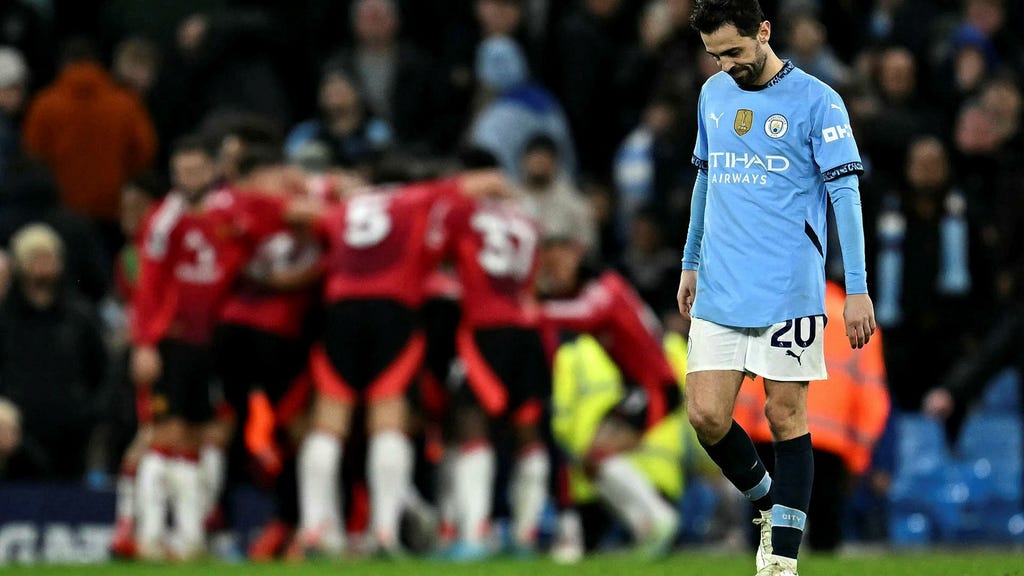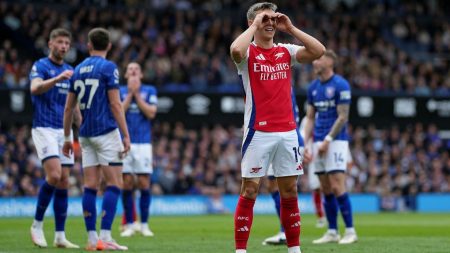The dramatic shift in Manchester United’s fortunes following the appointment of Rúben Amorim as manager, replacing Erik ten Hag, has begun to manifest in tangible results. The electrifying comeback victory against Manchester City in the derby, a 2-1 triumph snatched from the jaws of defeat, stands as a testament to Amorim’s impact. This victory wasn’t just three points; it symbolized a resurgence of the fighting spirit and resilience that had seemingly been lost under the previous regime. The manner of the win, orchestrated by key players like Bruno Fernandes and Amad Diallo, suggests a deeper tactical shift and a renewed sense of belief within the squad.
Amorim’s arrival appears to have instilled a fresh sense of purpose and tactical clarity. While the specifics of his system are still unfolding, early signs point to a more dynamic and aggressive approach, leveraging the pace and creativity of players like Diallo. The team’s response to going a goal down against their fierce rivals highlighted their newfound mental fortitude. Instead of succumbing to the pressure, they displayed a tenacity and belief, culminating in a late surge that saw them snatch victory in the dying embers of the game. This shift in mentality, from fragility to fortitude, can be directly attributed to the change in leadership and the positive influence of Amorim.
The individual performances of key players further underscore the positive impact of the managerial change. Bruno Fernandes, often criticized for inconsistency under Ten Hag, seems revitalized under Amorim’s guidance. His influence on the game, particularly in the final third, was palpable, and his contribution to the comeback underscores his importance to the team. Similarly, Amad Diallo, a player whose potential had flickered intermittently, showcased his electrifying talent with a decisive impact. These individual improvements are not coincidental; they are a product of a more conducive tactical framework and the renewed confidence instilled by the new manager.
Beyond individual brilliance, the victory against Manchester City showcased a collective resurgence. The team displayed a greater cohesion and understanding of their roles within Amorim’s system. The players appeared to be playing with a renewed sense of freedom and purpose, combining intricate passing moves with incisive runs to unlock the City defense. The defensive solidity, often a vulnerability under Ten Hag, also showed marked improvement, suggesting that Amorim has addressed the team’s defensive frailties. This holistic improvement, encompassing both attack and defense, is a clear indication of the positive impact of the managerial change.
The implications of this derby victory extend beyond the immediate three points. It signifies a potential turning point in Manchester United’s season, injecting a much-needed dose of optimism and momentum. The win not only closes the gap on their rivals but also sends a powerful message to the rest of the league that Manchester United is a force to be reckoned with once again. The manner of the victory, a spirited comeback against a formidable opponent, will undoubtedly galvanize the squad and foster a belief that they can compete with the best. This renewed confidence will be crucial as they navigate the challenges that lie ahead.
While it is still early days in Amorim’s tenure, the early signs are undeniably promising. The derby victory, a microcosm of the positive changes he has implemented, suggests that Manchester United is on an upward trajectory. The tactical adjustments, the improved individual performances, and the renewed collective spirit all point to a brighter future under his leadership. While the true measure of his success will be judged over the long term, the initial impact has been nothing short of remarkable, breathing new life into a team that had appeared stagnant and devoid of direction. The victory against Manchester City serves as a powerful statement of intent, signaling the dawn of a new era at Old Trafford.














